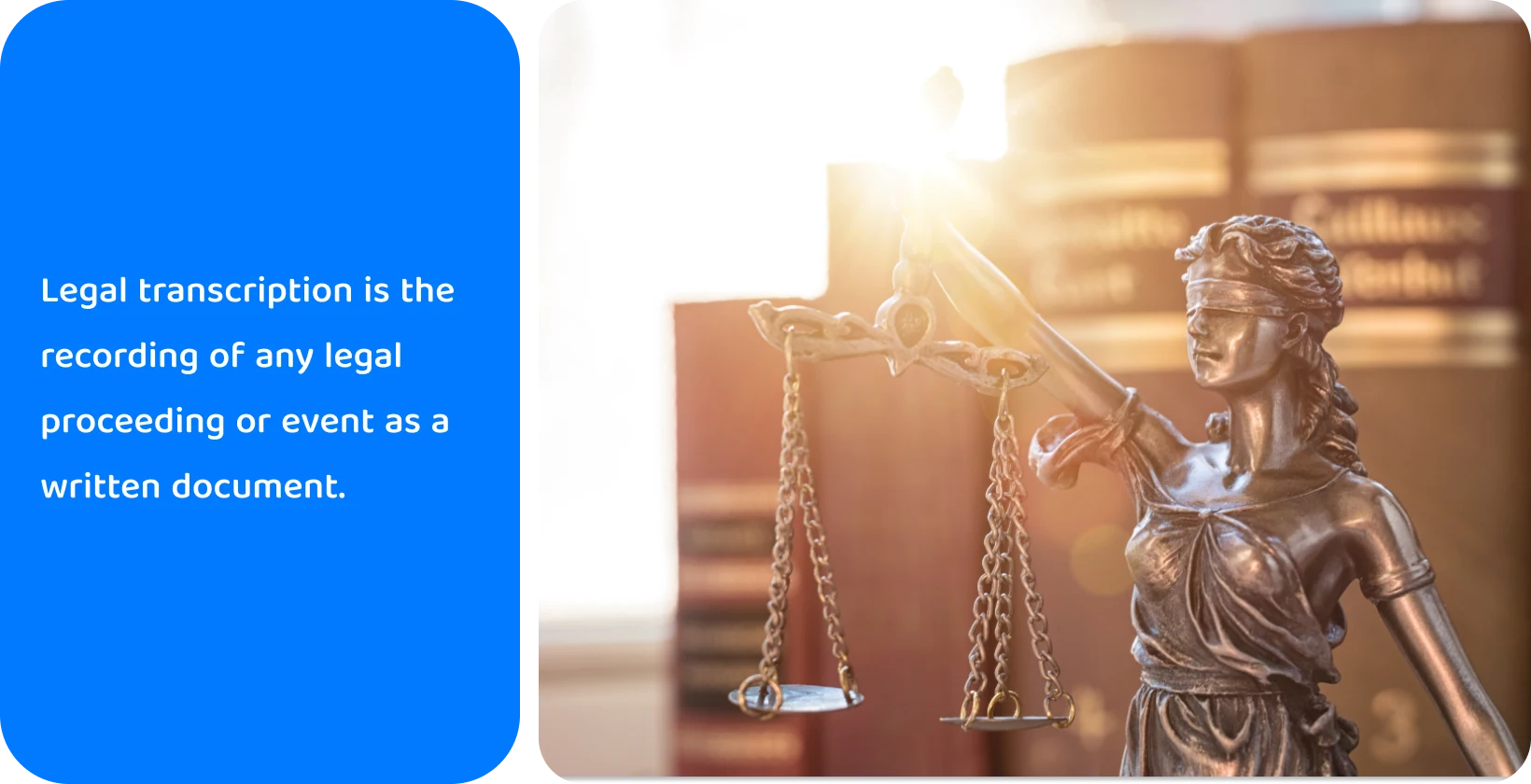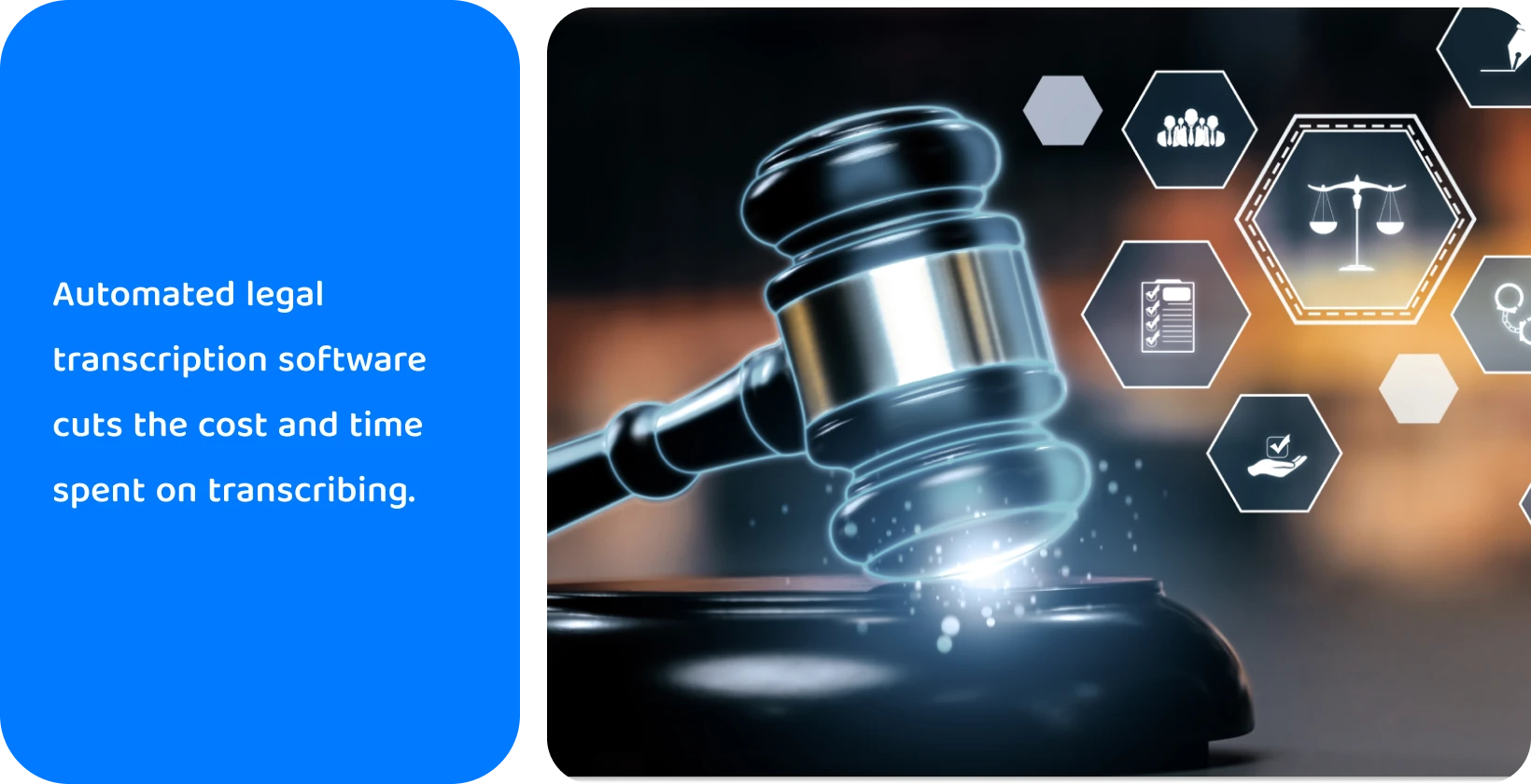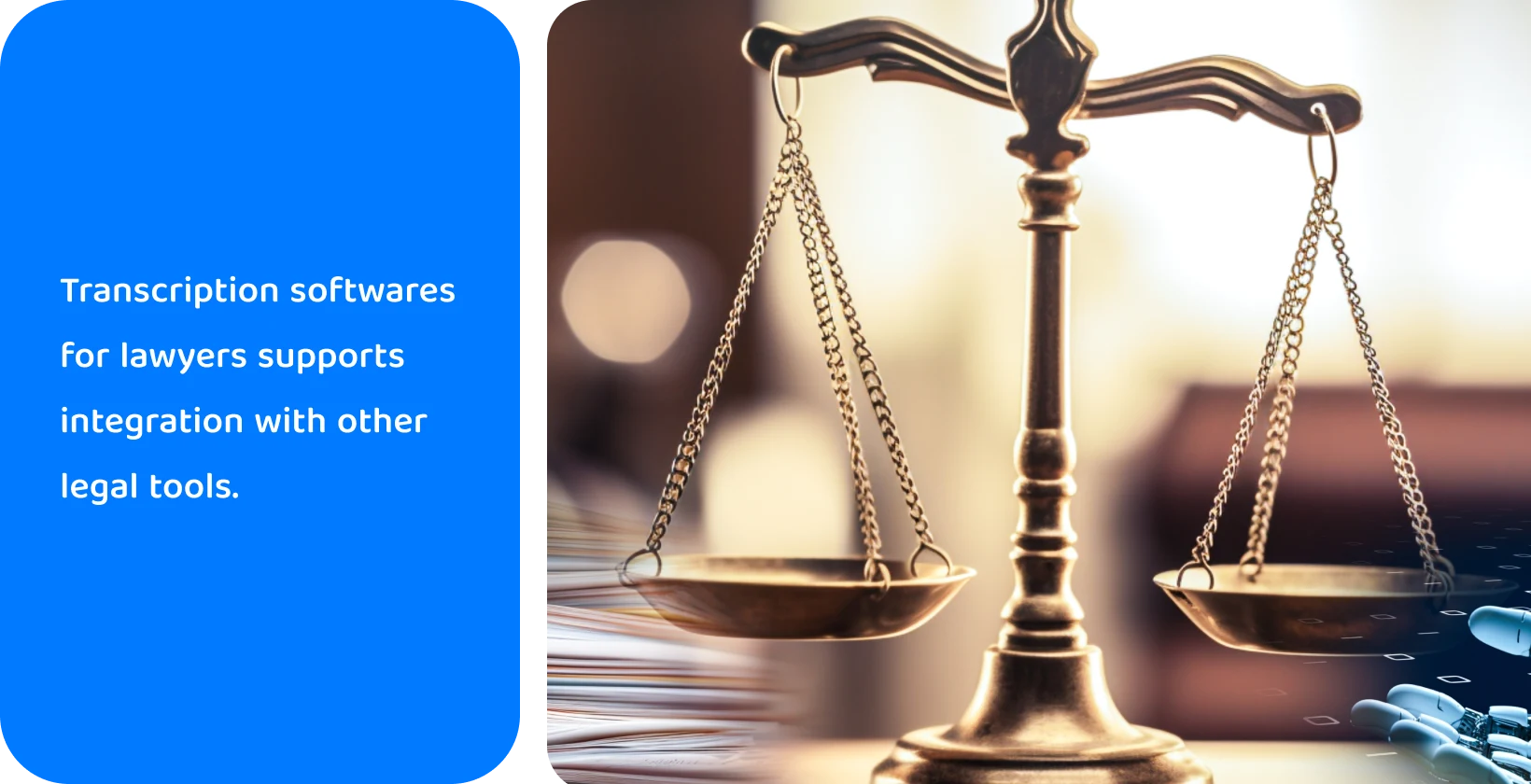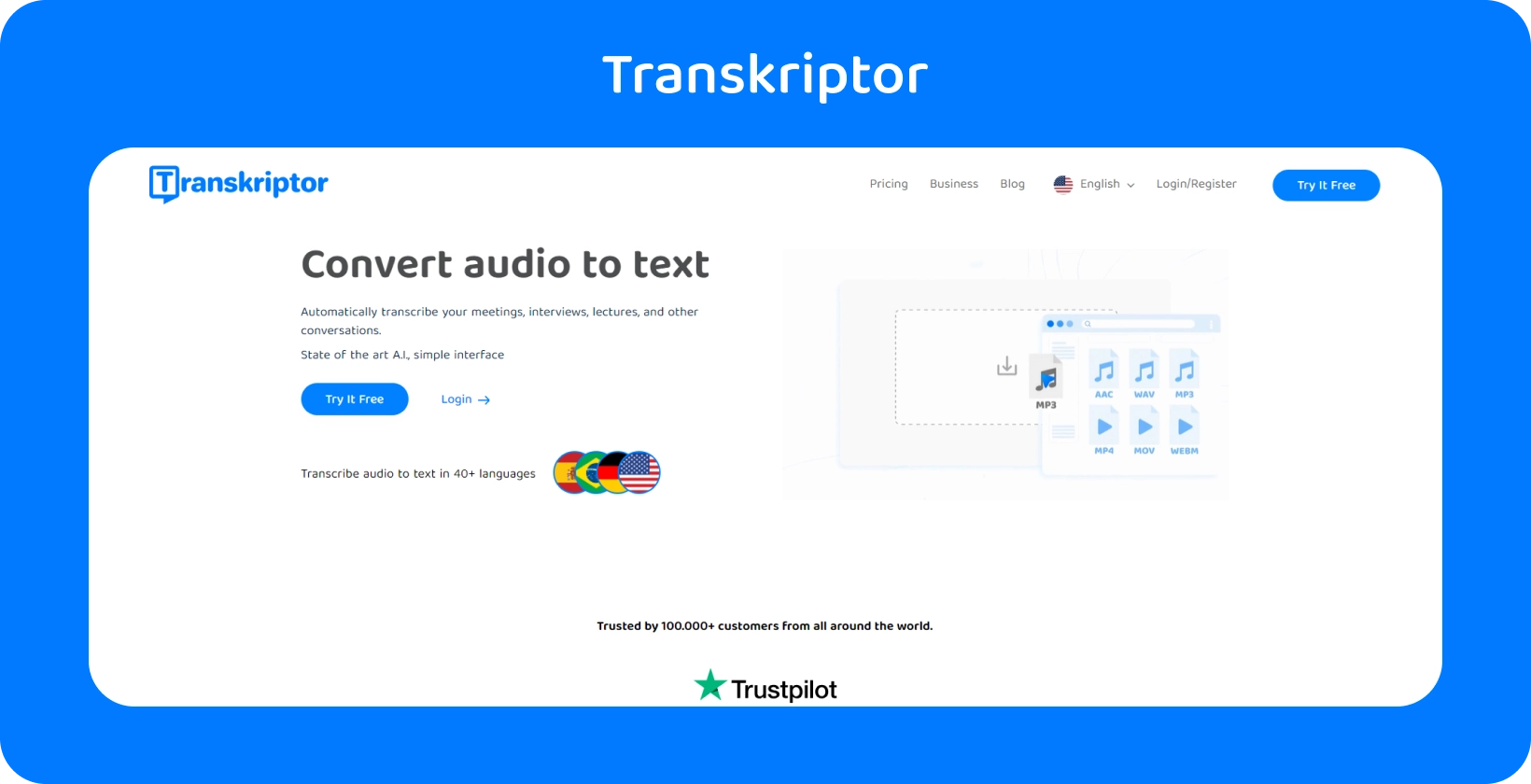Transcription tools are essential for legal professionals because they provide a reliable record of legal proceedings that allows users to reference important moments without having to watch several hours of video footage, and serves as a valid form of evidence in court to support or refute witness testimonies.
Legal transcription serves as proof that procedure is being followed in court since it documents which evidence is being introduced and how it is presented. Legal proceedings are often long and complicated, so legal transcription verifies that the evidence presented throughout is relevant and reliable.
Users need to assess the software's accuracy in recognizing legal jargon and its specialized features, like an industry-specific dictionary or automated timestamping when choosing a legal transcription service. Evaluate, also, the ease with which a new user learns to use the program effectively. Transcription services for legal professionals must take extra measures to ensure the complete privacy of users’ data.

What is Legal Transcription?
Legal transcription is the recording of any legal proceeding or event as a written document. Legal transcription is performed by legal transcriptionists or transcription software.
Legal transcription is one step ahead of court reporting, because it captures emergency calls, witness interviews, depositions and interrogations, as well as all court proceedings. Legal transcripts allow attorneys to search and cross-reference important moments in trial without having to watch several hours of video recordings.
Why is Transcription in the Legal System Crucial?
Transcription is crucial in the legal system because it guarantees a reliable record of court proceedings, more accurate than notes made in real time. Legal transcription is also a time-saving tool, as without it the attorney or paralegal has to watch the recording of the video several times to review what happened and pinpoint specific information.
Legal transcripts are a valid form of evidence in court, documenting everything said during the hearing or deposition, so witnesses are able to refer back to them to support their testimony. Prosecuting attorneys are able to use legal transcripts to challenge the testimonies of the witnesses from the defense side, and defending attorneys are able to use legal transcripts to challenge the testimonies of witnesses from the prosecution side.

What to Consider while Choosing Transcription Services for Legal Practices?
The right transcription service for legal professionals streamlines the process by generating text in a number of minutes which is searchable, editable and shareable. Automated legal transcription software cuts the cost and time spent on transcribing in half.
The most important things to consider while choosing transcription services for legal practices are listed below.
1. Legal Compliance in Transcription
Human transcriptionists need specialized training and certification to work in a court of law, like the Certified Legal Transcriptionist (CLT) accreditation from the American Association of Electronic Reporters and Transcribers (AAERT).
Transcription licenses indicate that the holder has a thorough knowledge of legal terminology, procedures and court policies. The standards that legal transcription software must follow relate to the security of the user’s data rather than how the application performs.
2. Accuracy in Legal Terminology
Every word is important in legal language, so legal transcription software must be 100% accurate to avoid any misunderstandings, misinterpretations or legal disputes. Standard transcription software struggles to recognise legal jargon, resulting in errors in the transcript.
Some professional transcriptionists use general transcription software to generate a draft transcript which they edit for mistakes or missing words, but this defeats the purpose of using an automated tool for this task.
Legal language is so complex that any small error in transcription runs the risk of significantly changing the meaning of the text. Legal transcription software is trained to recognise legal terms, abbreviations and industry-specific phrasing in a number of minutes, compared to the years of training and several days to complete the transcript needed by a human writer.
3. Specialized Features for Legal Needs
Some legal transcription software includes advanced features like automated timestamping, speaker identification, and synchronizing the text with the video recording which makes it easier for legal professionals to navigate through the document.
Automated transcription software for lawyers come with built-in dictionaries containing the legal terms and phrases relevant to different types of law , like criminal, civil or administrative to ensure they are transcribed accurately.
4. Time Savings for Legal Professionals
Legal transcription software needs to be intuitive and straightforward to use, so that legal professionals are easily able to get to grips with the program and start using it straight away. The point of legal transcription software is to speed up the process of transcribing the court proceedings which is often long and repetitive.
5. Confidentiality and Security of Legal Information
Confidentiality is arguably the most important consideration when choosing a legal transcription software. Legal professionals deal with a vast amount of sensitive information on a daily basis, which must remain private for the sake of their clients, so transcription services for lawyers take extra measures to ensure data security.
Dedicated legal transcription softwares use password protection, end-to-end data encryption and cloud storage to ensure complete privacy of their user’s information and prevent data breaches. Legal transcription software adhere to strict privacy policies, which users are able to check in user reviews. It is crucial that legal transcription software abides by industry standards like the General Data Protection Regulation (GDPR), which limits how long companies are able to store data and for what uses.
Cloud storage is popular for sensitive transcription files containing information which has the potential to be used to identify a specific individual because it is more secure. Cloud storage offers more privacy because it is backed up automatically at regular intervals, without a human employee having to look at the data to do so. It is cheaper to expand cloud storage than to buy additional storage devices to accommodate a growing project.
6. User-Friendly Platform for Legal Collaboration
Legal professionals benefit from transcription tools which allow them to easily share transcript files amongst their team, including any edits, highlights or notes they make to the text. Legal transcription software which supports multiple users accessing the same transcript at once enables real-time collaboration between attorneys, paralegals and legal assistants. Collaboration features in legal transcription tools allow team members to work from different locations, whether they are working from home as a one-off or based in a different city.
Legal transcription software typically has access controls and permissions which restrict the users that are able to view, edit or comment on a transcription, to guarantee that sensitive information is only accessible to authorized individuals.
7. Scalability for Growing Legal Needs
Automated transcription software uses cloud storage because it is able to handle a larger volume of data than local storage, and doesn’t require users to buy additional hardware for large-scale transcription projects or to accommodate multiple ongoing cases.
Law firms are unable to forecast when they will need to scale their storage capacity up or down. Cloud storage is flexible since it allows them to increase or decrease their storage. Cloud storage is less expensive for legal professionals than investing in on-site local storage since they are able to adjust the amount that they are paying for at any time.

8. Reviews and References from Lawyers
It is essential to check customer testimonials to see if other users find the program to be accurate, reliable and easy-to-use before purchasing a legal transcription software. Legal professionals should consider the accuracy of the transcription software with regards to how well it handles legal terminology and different speakers, as this determines how much time they have to dedicate to editing the final transcript.
Expert reviews of legal transcription software serve as essential sources of information, allowing prospective users to see the specialized features and security measures each software offers. These reviews provide insights into how straightforward the software is to use and the options available for collaboration. Transcription softwares for lawyers sometimes supports integration with other legal tools like case management systems and databases.
9. Dedicated Customer Support for Legal Professionals
Legal transcription software processes sensitive information, so users benefit from 24/7 customer support that they are able to contact in the case of technical difficulties. Customer support is crucial for users of legal transcription software who need help learning how to use the full range of features.
10. Cost Structure Aligned with Legal Budgets
Using legal transcription software is cheaper than hiring a human transcriptionist ranging from $0.10 to $0.25 per minute. Costs are depending on the length of the audio, background noise, the number of speakers and how quickly the user needs the order.
Legal transcription services often have competitive pricing and options to upgrade to human transcription for a higher price. Consider the tool’s value for money when choosing a transcription software for legal purposes to ensure it fits in the budget.

Transkriptor Provides Automated Transcription for Lawyers
Transkriptor is a strong choice for legal professionals because it guarantees accuracy.
Transkriptor is a powerful tool which guarantees exceptional accuracy, of at least 99%. Transkriptor offers extensive language support of over 100 languages, collaboration tools, speaker identification, synchronization of the text with video.
Transkriptor encourages its users to email the customer service team for any concerns. The team is renowned for their prompt responses and commitment to customer satisfaction. Transkriptor, also, offers competitive pricing with no hidden fees, making it a cost-effective legal transcription solution for all-sized law firms. Try it now!


